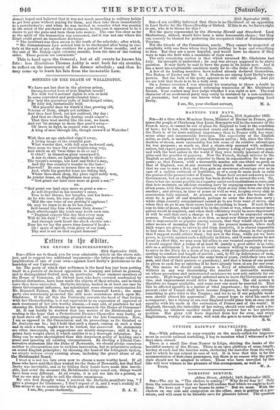MANNING THE NAVY.
London, 27th September 1852. Sin—At a time when Monsieur Duces, Minister of Marine in France, pro- mises the people of Cherbourg that Louis Bonaparte will be the restorer of the French navy, it cannot be out of place for England to look to the condition of here ; for to her, with unprotected coasts and an insufficient land-force, the Navy is of far more national importance than to France with her enor- mous army and innumerable fortresses. The superiority of the English sailor, as such, is undisputed by any European nation ; but, since the intro- duction of steam, mere seamanship has lost some of its relative advantages for war purposes ; so much so, that a steam-ship manned with ordinary sailors, but expert gunners, would speedily destroy a ship of equal force man- ned with the best sailors in the world if they were totally ignorant of disci- pline and the practice of gunnery. Now the French, though inferior to the English as sailors, are greatly superior to them in organization for war pur- poses; so that France, with a mercantile marine not one-third as great as that of England, can at any moment bring double the number of sailors that we can to man a fleet, and thus gain an enormous advantage over us in case of a sudden outbreak of hostilities, or of a coup de main such as snits the genius of the present ruler of France. These facts are not unknown to-our Government, but as yet no remedy has been devised to correct the evil. Sir, there is but one means possible in a country under such institutions as ours; and that is to maintain an efficient standing navy by engaging seamen for a term of ten years, with the power of transferring them at any time from one ship to another ; and always, in time of peace as well as war, keeping every ship in commission fully manned. At present, as soon as a sailor has become effi- cient be is paid off and dismissed, perhaps to enter the American navy while ships recently commissioned cannot go to sea from want of crews, and when they do go to sea their crews have everything to learn. If such be the case in time of peace, what would it be in the event of war, when so many more sailors would be required, and when their efficiency would be more important? It will be said that such a change as I suggest would be unpopular among seamen. Possibly it might be so at first, as most new things are unpopular ; but is impressment so popular among seamen, that they would object to any other means of manning the Navy ? At the present moment, when such high wages are given to crews to and from Australia, it is almost impossible to find men for the Navy ; and it is not likely that the change in the system that I suggest would attract them ; but now is the time, while yet we have peace, to provide against such a difficulty in future, and if some means be not found to effect this, we may soon bid adieu to our vaunted superiority at sea. I would suggest that a bonus of at least 61. (surely a good sailor is as valu- able as a militiaman !) be given to every seaman willing to engage himself to serve in the Navy for a term of ten years, with prospective advantages ac- cording to conduct and length of service ; and, to fill up deficiencies of men, that boys be entered for at least the same term of years, (with their own con- sent, and that of their parents or guardians,) and that a bonus of one pound be given to each boy so entering if he have already been at sea for one year. By this moans we should soon possess a Navy of admirable efficiency, without in any way diminishing the number of mercantile seamen, on whose precarious and uninstructed assistance we now rely entirely for our security. High wages will tempt unbound men to leave the Government ser- vice, and impressment would drive them to America. The old system is therefore no longer available, and some new one must be resorted to. That this be effected speedily is a matter of vital importance ; for when once the present ruler of France shall have become Emperor, he will surely attempt something to give eclat to the Empire ; and wo to us if our palpable weak- ness should attract his aggression! He cannot hope to rival his uncle as a conqueror; but a victory at sea over England would place him at once onan equality with his uncle in the estimation of France and of the world ! If England, through the imbecility of her rulers, should ever suffer such a hu- miliation, no ultimate sacrifice could possibly restore her to her previous position. Her glory will have departed from her for ever, and every Englishman, worthy of the name, will wish the grave to cover his shame? R. G.


























 Previous page
Previous page